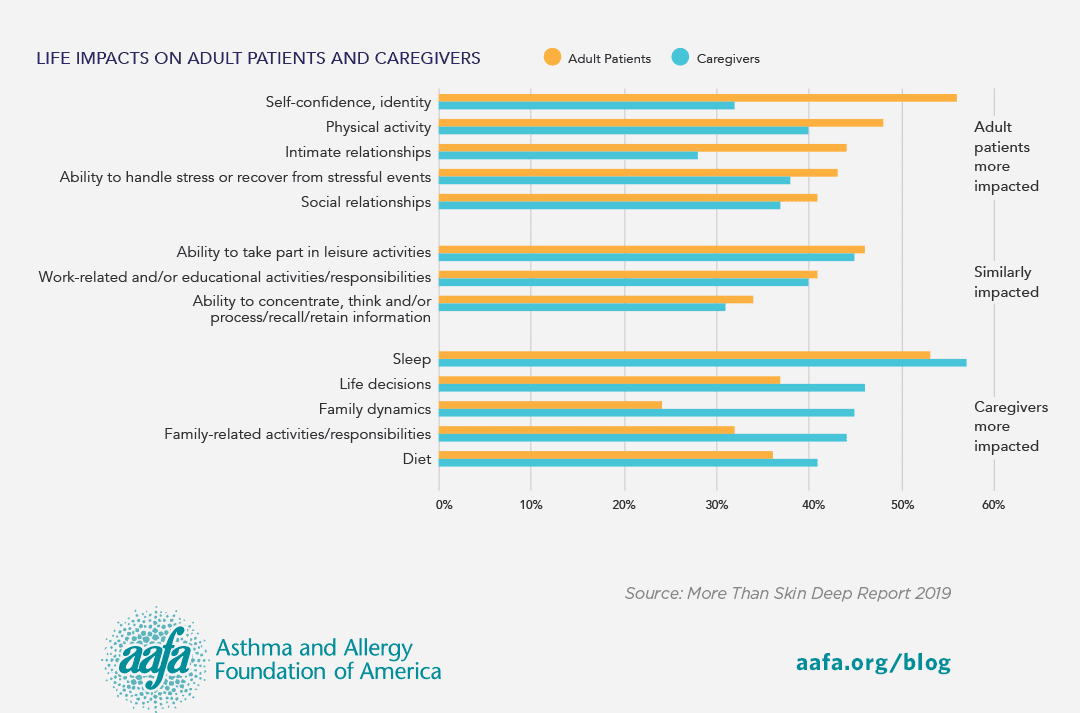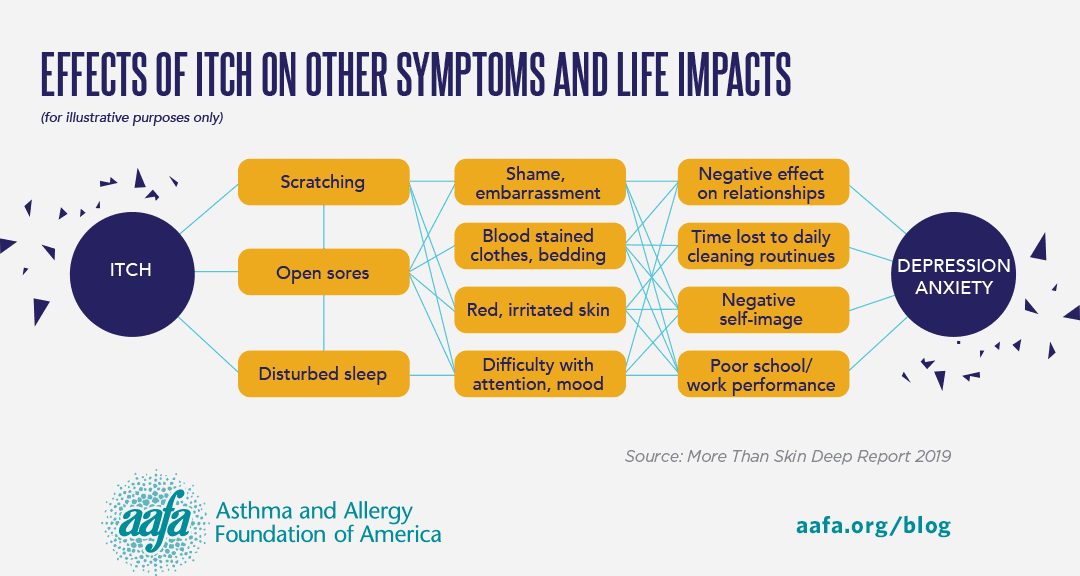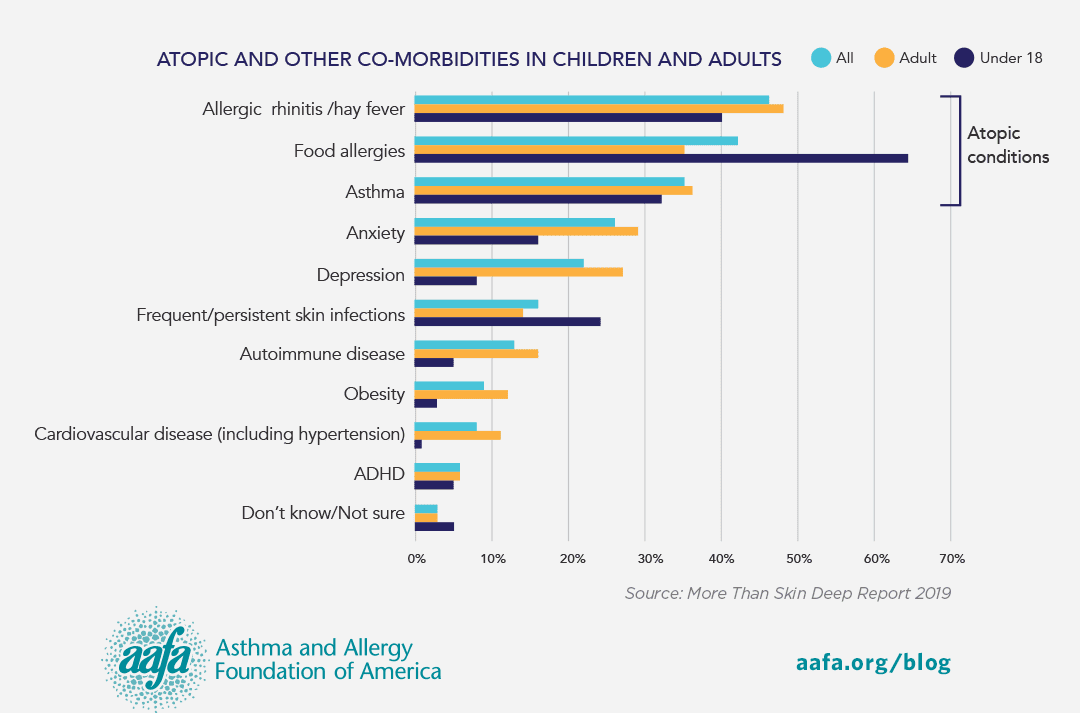Around 16.5 million adults in the U.S. have eczema.1 And of those, 6.6 million have moderate-to-severe eczema. Atopic dermatitis is the most common type of eczema. But despite such a large number of people with eczema, it’s still widely misunderstood. October is National Eczema Awareness Month. We can work together to spread eczema awareness and understanding.
To raise awareness about eczema, the Asthma and Allergy Foundation of America (AAFA) and five other patient organizations came together on a project called “More Than Skin Deep.” We surveyed patients and caregivers on what it is like to live with and manage eczema. We then presented the results to the Food and Drug Administration (FDA) to help inform research and development for eczema treatments.
Here are some facts about eczema, along with some findings from the “More Than Skin Deep” survey.
1. Eczema is not just “dry skin.”
It is so much more than that. It is a chronic inflammatory skin disease. Symptoms include an itchy, scaly rash that can appear on the face, hands, arms, legs, and other parts of the body. The rash can be widespread. It may look ashen white/gray, purple, or dark brown on darker skin tones. It may look red on lighter skin tones.
In our “More Than Skin Deep” survey, we asked about the top three eczema symptoms that caused the most issues and discomfort. People said the most troublesome symptoms were:
- Itching (79%)
- Inflamed skin (47%)
- Sleep disturbance (29%)
- Dry, sensitive skin (23%)
- Rough, leathery, or scaly patches of skin (20%)
Eczema is linked to dry skin, but its symptoms can cause pain, physical discomfort, and sleep issues. It can have a significant social and emotional impact on people who have it and their caregivers.
Eczema doesn’t just affect the skin. Over half of the people who took our survey said eczema had major impacts on:
- Sleep
- Self-confidence and identity
- Physical activity
- Intimate relationships
- Social relationships
Eczema can affect caregivers differently. Adult caregivers said caring for someone with eczema affected their:
- Sleep
- Life decisions
- Family-related activities
- Family dynamics
- Diet

2. Eczema is not contagious.
It is the result of an immune response. You can’t catch it by being around someone with eczema. But it can be hereditary. That means if someone in your family has eczema, asthma, or allergies – like a parent, grandparent, or sibling – you could have it too.
Eczema usually begins in childhood, but adults can develop it too. In our “More Than Skin Deep” survey, we found:
- Nearly three-quarters (72%) of people said they had eczema symptoms before age 18
- Nearly one-third said symptoms started within the first six months of life
- For adults who had symptoms after the age of 18, most reported eczema symptoms starting between ages 51-64
3. Eczema can be triggered by more than just allergens.
There are many substances that can trigger eczema. They can be different for everyone. But the most common triggers are:
- Allergens– dust mites, pollen, pet dander
- Soaps and cleaners
- Metals – nickel (jewelry, cellphones, belt buckles, etc.)
- Rubber latex (latex gloves, elastic waistbands, balloons, etc.)
- Perfumes, dyes, and other fragrances
- Formaldehyde (nail products, disinfectants, and some clothing)
4. Eczema is related to asthma and allergies.
Asthma, allergies, and eczema are all allergic diseases. Many people have more than one of these conditions. They all involve responses of the immune system.
They are also part of a natural progression of allergic diseases called the “allergic march.” It is also sometimes called the “atopic march.” The allergic march tends to start with dry skin and then moves to eczema, food allergies, nasal allergies (rhinitis), and then asthma.
Protecting a baby’s skin with moisturizers or ointments from birth may reduce the risk of eczema.
Our survey found that more than 20% of people had at least one of these five conditions in addition to eczema:
- Allergic rhinitis (46%)
- Food allergy (42%)
- Asthma (35%)
- Anxiety (26%)
- Depression (22%)
The top three conditions in this list are part of the “atopic march.”
5. Eczema can be managed and treated.
There are several treatment options available. But eczema is a very individual disease. If you have eczema, work with your doctor to find the best combination of treatment to help relieve pain and itching and improve your quality of life.
Here are some available treatments:
- Over-the-counter (OTC) moisturizers and barriers
- OTC medicines and products like topical hydrocortisone
- OTC antihistamines
- Prescription oral or topical corticosteroids and topical calcineurin inhibitors (TCIs)
- Antibiotics for skin infections
- Phototherapy (ultraviolet light)
- Biologics – Dupilumab (DUPIXENT®) is the only biologic currently available to treat eczema
Most people said they use topical and oral corticosteroids to treat eczema in our survey. Many people also said they try self-care and complementary or alternative treatments, such as changes in bathing. Other changes people made to manage their eczema included controlling activity or exposure to triggers.
Many people with eczema use multiple OTC treatment products to help manage their eczema. More than half of the people who took the “More Than Skin Deep” survey said they use three or more OTC products. One in five persons said they use five or more products.
Learn more about the “More Than Skin Deep” project.
Updated October 2021
Eczema is not a condition you have to face alone. Our online community is for people to share and learn together in an encouraging and supportive environment. Join our free community to connect with others, keep up to date on news and research, and to learn ways to best manage your conditions. We can overcome eczema better together.
References
1. Silverberg JI, Hanifin JM. Adult eczema prevalence and associations with asthma and other health and demographic factors: a US population-based study. J Allergy Clin Immunol. 2013;132(5):1132-1138.




Comments (4)